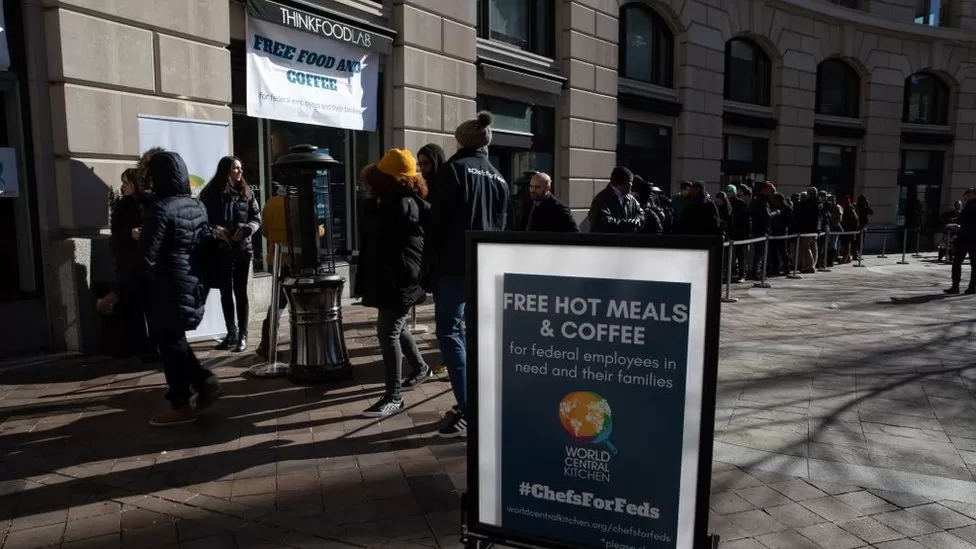
By SinAfricaNews September 30, 2023 0 Comments
Faced with a rebellion by hard-line Republicans in his party, House Speaker Kevin McCarthy needs support from Democrats.
The bill also must pass the Senate.
marriage licences to food aid.
On Saturday morning, Speaker McCarthy said he would put a 45-day continuing resolution (CR) plan to the floor – a stop-gap that would keep federal agencies open until Congress can agree on a new funding bill.
The CR would include disaster relief funding, but would not include US foreign aid for Ukraine, which Democrats have been insisting on.
Republicans control the House by a slim majority, while Democrats hold the Senate by a single seat.
That means spending bills to keep the government open require buy-in from both parties in order to advance through both chambers to President Joe Biden’s desk.
A rebel faction of right-wing Republicans has, so far, held up negotiations in the House, the lower congressional chamber, with a demand for significant cuts in spending, including a call for no more US funding of the war in Ukraine.
Receiving vocal support online from former President Donald Trump, the hard-liners have tanked efforts by Mr McCarthy to shepherd legislation needed to break the impasse through the House.
Mr McCarthy has also refused to take up a short-term funding bill making its way through the Senate. The bill, which includes $6bn (£4.9bn) for Ukraine and $6bn for disaster aid, is a last-ditch effort to avert a lengthy shutdown and appears to have strong bipartisan support in the upper chamber.
On Friday, House Republicans’ short-term funding measure, which included strict border policies championed by the hardliners, was rejected by as many as 21 members of the party and failed to pass.
In a closed-door meeting, Mr McCarthy said that Republicans would have to opt for the House bill or the Senate’s version, or risk being blamed for a shutdown.
But the rebel lawmakers asserted they would not budge for anything less than a long-term spending bill with their priorities addressed.
“This take it or leave it or I’ll blame you won’t work on us,” South Carolina Congresswoman Nancy Mace, a moderate who voted against the House bill on Friday, wrote on X.
“I’m in this for the long run and have no problem taking on DC to do it.”
The shutdown will also have an immediate impact on the Special Supplemental Nutrition Program for Women, Infants and Children (WIC), which provides grocery assistance to seven million pregnant women and new mothers.
A prolonged shutdown could also affect the Supplemental Nutrition Assistance Program (SNAP), a grocery benefit known as “food stamps” that serves 40 million low-income Americans, and hinder the implementation of a new programme to serve free breakfast and lunch to students in high-need school districts.
Museums, national parks, research facilities and communities health centres with federal government oversight or funding are likely to suspend operations for the period of the shutdown.
Additionally, the government agency at the helm of relief and recovery from natural disasters is currently scrambling to conserve cash in the event a shutdown collides with an above-normal Atlantic hurricane season.
Budget disputes that cause this kind of disruption do not occur anywhere else in the world and has been criticised as an example of Washington’s growing dysfunction and partisan divides.
The last government shutdown, under Mr Trump in 2019, lasted a record 34 days.
It erased $11bn in economic output, according to the Congressional Budget Office, and federal workers were seen standing in line at food banks.
SOURCE: BBC NEWS
Join our global community of readers who seek to understand the evolving dynamics between China & Africa. Let's see the world from the Global South's perspective.
SINAFRICANEWS brings you a new narrative of our World from a Sino-African Perspective
SINAFRICANEWS 2026 © All Rights Reserved. Design & Developed by VW Themes
You must LOG IN first!
Javascript not detected. Javascript required for this site to function. Please enable it in your browser settings and refresh this page.

